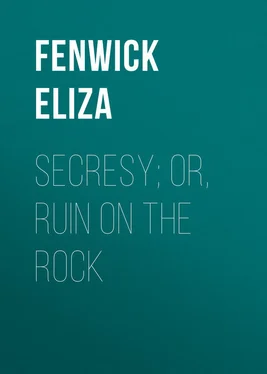Eliza Fenwick - Secresy; or, Ruin on the Rock
Здесь есть возможность читать онлайн «Eliza Fenwick - Secresy; or, Ruin on the Rock» — ознакомительный отрывок электронной книги совершенно бесплатно, а после прочтения отрывка купить полную версию. В некоторых случаях можно слушать аудио, скачать через торрент в формате fb2 и присутствует краткое содержание. Жанр: foreign_antique, foreign_prose, foreign_sf, на английском языке. Описание произведения, (предисловие) а так же отзывы посетителей доступны на портале библиотеки ЛибКат.
- Название:Secresy; or, Ruin on the Rock
- Автор:
- Жанр:
- Год:неизвестен
- ISBN:нет данных
- Рейтинг книги:3 / 5. Голосов: 1
-
Избранное:Добавить в избранное
- Отзывы:
-
Ваша оценка:
- 60
- 1
- 2
- 3
- 4
- 5
Secresy; or, Ruin on the Rock: краткое содержание, описание и аннотация
Предлагаем к чтению аннотацию, описание, краткое содержание или предисловие (зависит от того, что написал сам автор книги «Secresy; or, Ruin on the Rock»). Если вы не нашли необходимую информацию о книге — напишите в комментариях, мы постараемся отыскать её.
Secresy; or, Ruin on the Rock — читать онлайн ознакомительный отрывок
Ниже представлен текст книги, разбитый по страницам. Система сохранения места последней прочитанной страницы, позволяет с удобством читать онлайн бесплатно книгу «Secresy; or, Ruin on the Rock», без необходимости каждый раз заново искать на чём Вы остановились. Поставьте закладку, и сможете в любой момент перейти на страницу, на которой закончили чтение.
Интервал:
Закладка:
It is true, your aunt was neither as coquettish nor had she the sprightly wit nor the mischievous gaiety of lady Margaret, but she loved crowds, detested solitude, and was a votary of dissipation; to convince her how much he had studied her inclinations, and how much he meant to gratify them, no sooner was Mr. Valmont in possession of his bride then he snatched her from the scenes where her existence was alone valuable to her, and buried her amidst obscurity and horror at Valmont castle.
What is the consequence? she had no mental accomplishments in reserve for their mutual benefit and delight; nor had he mind enough to steal fire from heaven and animate with life the marble. From the struggle of tempers, and the warfare of words, she droops into an hypocondriac; he degenerates into a cynic, proud of himself alone.
Among the disappointments produced by this marriage, the want of children was the most offensive to Mr. Valmont. Your father, who had pursued a course of life quite different from his brother, tasting all the excesses of dissipation; died; and, very improperly in my opinion, left you to the guardianship of your uncle. That Mr. Valmont should adopt a son from the lowly condition of a cottager's child, has occasioned much wonder and many surmises; however, as I do not find any thing material either to you or me in the conjectures, I have listened to on this occasion, I shall not be at the pains of relating them.
But how comes it to pass, my dearest Sibella, that when your uncle had the means of gratifying his darling wish in educating two children, and one of them a female, to whom according to his creed, nothing should be granted beyond what the instinct of appetite demands, how comes it, I say, that you possess the comprehensive powers of intellect? from what sources did you derive that eager desire of knowledge of which I find you possessed; and how came you to be learned on subjects, which, in the education of females, are strictly withheld, to make room for trifling gaudy and useless acomplishments? tell me by what miracle I find you such as you are, and let me cease to wonder at you, but never let me cease to love you.
Tell me too, how came you to be dependent on your uncle? Does your dependence only mean the protection due from him who stands in the place of a parent to you? I wish to be informed what explanation Mr. Valmont and yourself affix to the term of dependent, when it is applied to you; for colonel Ridson talks so familiarly of the fortune you must possess from your mother, and also the wealth of the Valmont family which he says is yours by heirship, that I must own I am puzzled. I care little about your being rich, but is seems unnatural and unjust to have you a dependent on your haughty uncle.
Ah, my dear Sibella, how often in a day do I feast my imagination by allowing it to bear me back to you; and yet perhaps, our separation gives a spur, a stimulus to our friendship. I am not convinced, indeed, but that temporary separations are even useful between lovers; and that Mr. Valmont may have acted rather wisely than otherwise, in parting you and your Clement for a season. Why he should bid you remember him only as a brother, is really too far plunged into obscurity for me to discover.
Do not, however, suppose for an instant that my affection for you would decay were I at liberty to enjoy your society as I wish; on the contrary, I am persuaded that every hour I should pass with you would add something to my improvement, and render us more valuable to each other. My expression arose from my being at that moment in idea a partner of your seclusion, and feeling that I should want in the same situation that energy and activity which is the support of your solitude. I am fond of society; and, indeed, I find myself most excited when I have most opportunities of observing the various characters and pursuits of those around me. Gladly would I possess the power of selecting my society. From that happy privilege I am debarred. But I seldom make one of a circle in which I do not find some novelty of character, and something either of excellence or absurdity from which I may draw improvement.
Yet, a two month's visit at the villa of Sir Thomas Barlowe is rather a hard trial of my patience; and, unless we are enlivened by new visitors, I fear the company here will afford me but a trifling harvest of observation. I shall soon be glad to turn from them to my own resources; and fly, even oftener than I now do, to the ever vivifying remembrance of my Sibella.
Sir Thomas Barlowe has risen from some very obscure station to the wealth and dignity of a nabob. He has risen too, I greatly fear, by the same depredating practices which the unfortunate natives of India seem destined constantly to suffer from those who perfidiously call themselves the protectors of the country. Sir Thomas Barlowe's riches have become his punishment. Each morning, his fears awaken with his faculties, lest that day should bring tidings of the dreaded scrutiny; and, when evening arrives, and he struggles to yield himself to mirth and wine amidst the circle he has assiduously gathered round him, a word, a look, or the most remote hint or allusion gives his watchful terrors an alarm. A sudden turn of his head, perchance, discovers his shadow on the wall. Legions of threatening phantoms then crowd upon his apprehension; and the evening, yet more miserable than the day, concludes with an opiate, administered to lull the feeble body into lethargy, and hush the perturbed conscience into silence.
And my mother can look on this existing fact with indifference, while I shudder. Those enormous sums of wealth she lavishes away, that cluster of pearls she triumphantly places in her hair, those diamonds heaped into different ornaments, how were they obtained? Thousands perhaps – Oh, Sibella! I have laid aside my ornaments! A dress plain as your's supersedes them.
Lady Barlowe is a composition of a very curious kind. She is about forty years younger than her husband, is tolerably pretty, and has a showy talent of repartee that she mistakes for a sublime genius; and her inclinations are perpetually at warfare, without being able to decide whether she shall be most renowned as a wit or a beauty. She is extravagantly fond of admiration, which she formerly enjoyed unlimitedly, being the head toast of a small county town, till she became the wife of a nabob. Prosperity has not increased her happiness; for in the great and gay world she has found rivals of such magnitude that malice and envy have strung up within that bosom which till now owned no inmate but vanity.
These are our host and hostess. The first in precedency among the visitors ranks the Earl of Ulson: an antiquated gallant, who, in public, affects not to feel the approaches of age; and, in private, broods over the consciousness of its effects till he sickens with ill nature. The countess of Ulson hates her husband; nor has she over much charity and good-will towards other men. She talks largely, indeed, of her piety, and the strict performance of her manifold duties.
This amiable pair are attended by their son and two daughters. Lord Bowden is so perfectly satisfied within himself, that, if you will take his word for it, there is not a more amiable and accomplished young man in England. His eldest sister, lady Mary Bowden claims no praise beyond what is justly due to the complacency of her temper; she is at once too giddy and too indolent to aim at meriting a more enlarged praise; she loves dress, company, cards, and scandal; and indulges herself in the use of the latter as a mere matter of course, without entertaining the smallest particle of ill-will towards the very persons she helps to vilify. I have endeavoured to convince lady Mary of the folly of this practice, and she acknowledges, that what I say appears very much to the purpose, but then how can she cease to do what every body does.
Читать дальшеИнтервал:
Закладка:
Похожие книги на «Secresy; or, Ruin on the Rock»
Представляем Вашему вниманию похожие книги на «Secresy; or, Ruin on the Rock» списком для выбора. Мы отобрали схожую по названию и смыслу литературу в надежде предоставить читателям больше вариантов отыскать новые, интересные, ещё непрочитанные произведения.
Обсуждение, отзывы о книге «Secresy; or, Ruin on the Rock» и просто собственные мнения читателей. Оставьте ваши комментарии, напишите, что Вы думаете о произведении, его смысле или главных героях. Укажите что конкретно понравилось, а что нет, и почему Вы так считаете.












